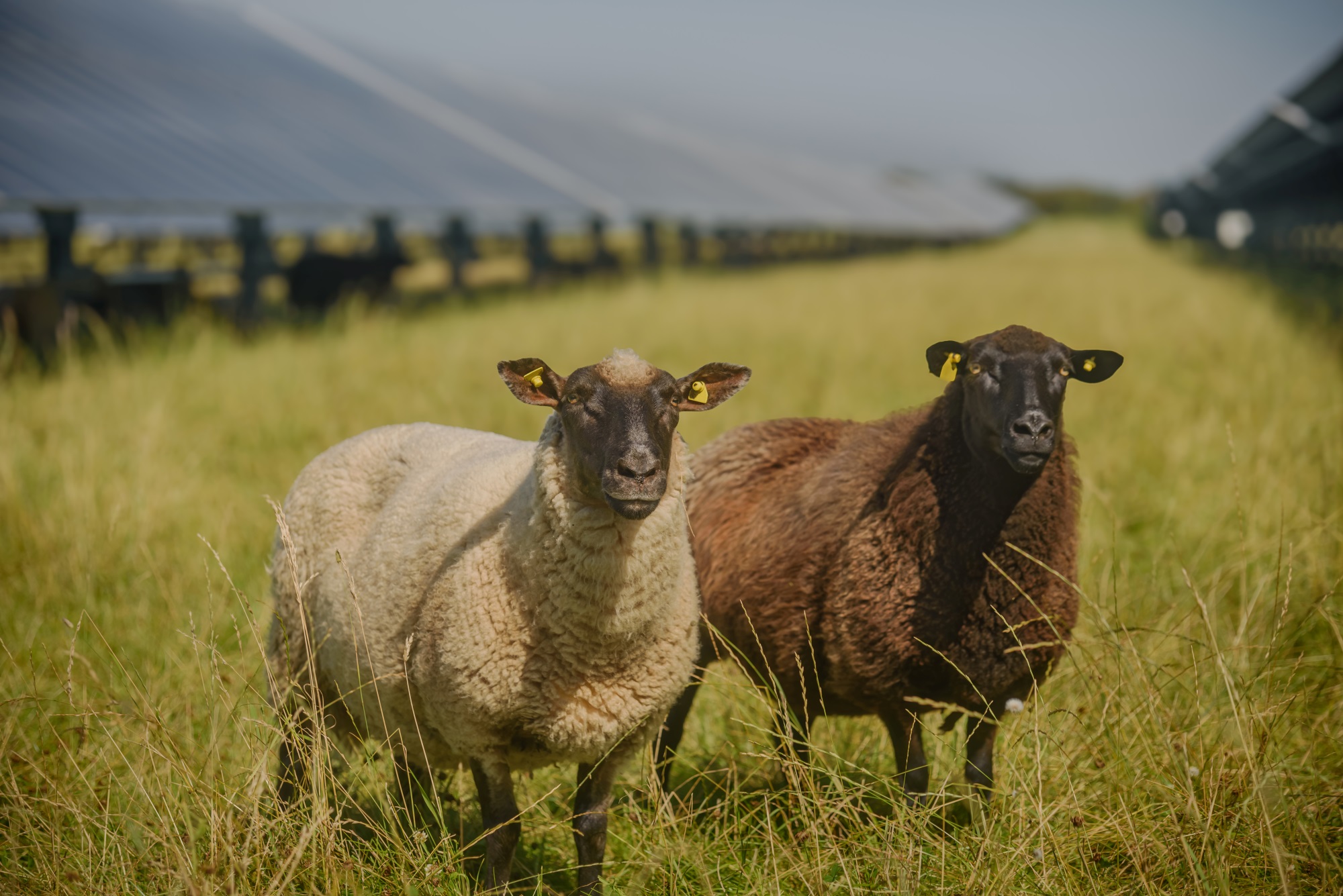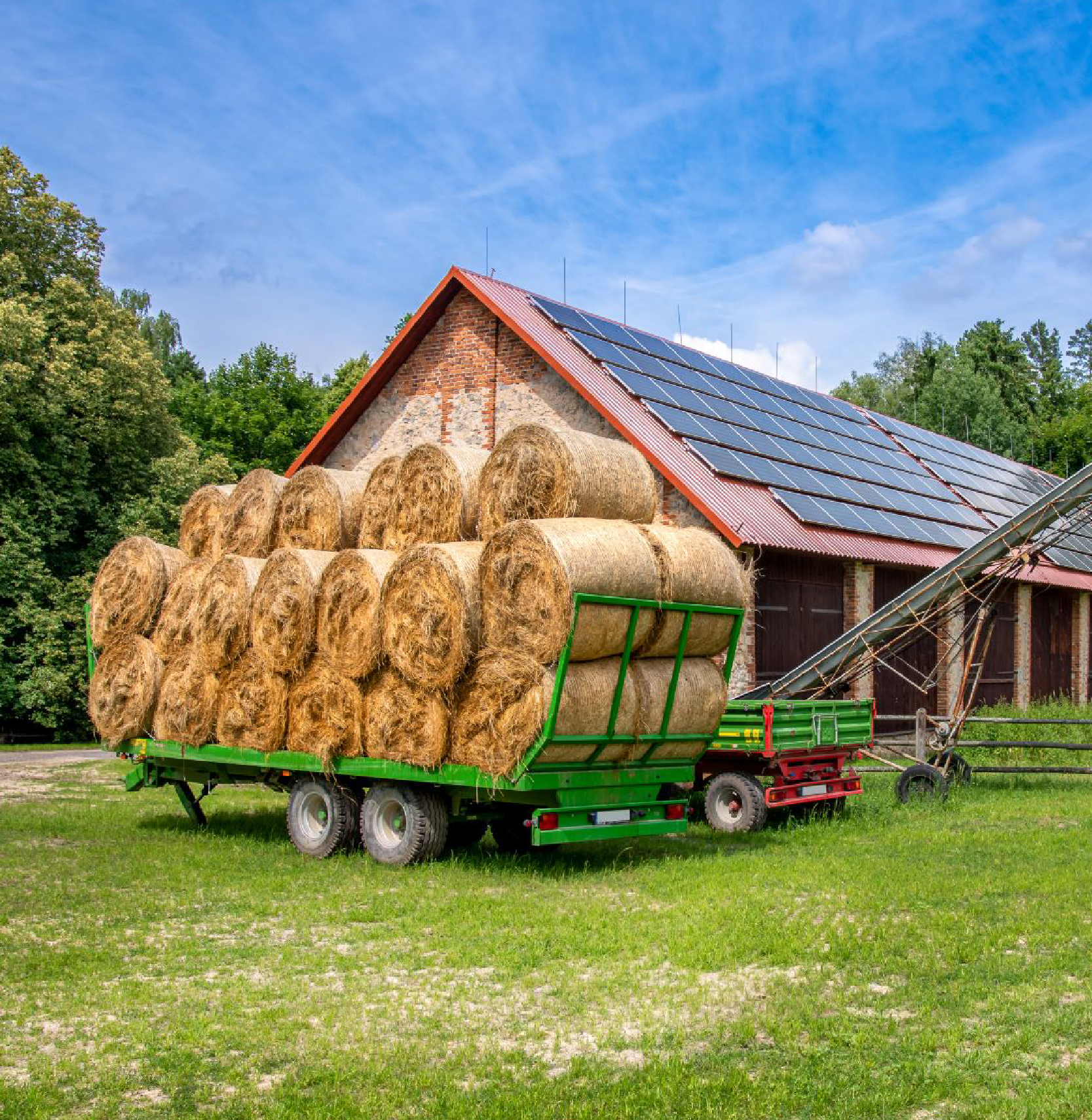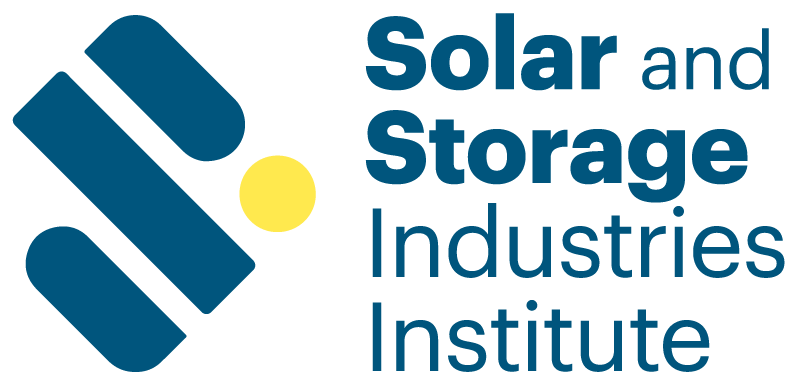
Agrivoltaics
As solar continues to expand to meet accelerating electricity demand, farmland has become an attractive option for project siting. By integrating solar with agriculture, farms across the country are demonstrating how agrivoltaics benefits their operations and local economies.

Agrivoltaics
As solar continues to expand to meet accelerating electricity demand, farmland has become an attractive option for project siting. By integrating solar with agriculture, farms across the country are demonstrating how agrivoltaics benefits their operations and local economies.

Agrivoltaics
As solar continues to expand to meet accelerating electricity demand, farmland has become an attractive option for project siting. By integrating solar with agriculture, farms across the country are demonstrating how agrivoltaics benefits their operations and local economies.
ABOUT —
What Are Agrivolatics?
According to the U.S. Department of Energy, agrivoltaics is defined as agriculture such as livestock grazing, crop production, or pollinator habitat that occurs under, between and around rows of solar panels.
Solar project development efforts have increasingly encountered public opposition due to concerns including farmland preservation and rising land prices. Agrivoltaics aims to address these concerns by maintaining agricultural activities under and around solar panels and by supporting farmers through additional income streams.
As agrivoltaic projects are increasing, so is the need to develop best practices to help address the challenges that commonly arise when integrating solar and farmland. SI2 is committed to identifying barriers to agrivoltaics development and workshopping solutions across all stakeholder groups.
More Shade
The shade provided by solar panels is beneficial to grazing livestock and crop growth, and can reduce irrigation needs
Pollination
Pollinator colocation can improve crop yield, and the native vegetation planted can improve soil health, increase water retention and reduce runoff
Benefits of Agrivoltaics
Agrivoltaics have increasingly been shown to provide benefits to the soil, crops and livestock maintained under and around the panels. They benefit farmers by increasing and diversifying their income while still
allowing for agricultural production.
Additional Income
Solar projects allow for an income stream outside of farmer’s traditional business, while allowing them to maintain their existing agricultural operations.
New Jobs
The installation of agrivoltaics supports the development of new short-term jobs in solar installations, while maintaining
agricultural employment.
Benefits of Agrivoltaics
Agrivoltaics have increasingly been shown to provide benefits to the soil, crops and livestock maintained under and around the panels. They benefit farmers by increasing and diversifying their income while still allowing for agricultural production.
More Shade
The shade provided by solar panels is beneficial to grazing livestock and crop growth, and can reduce irrigation needs
Pollination
Pollinator colocation can improve crop yield, and the native vegetation planted can improve soil health, increase water retention and reduce runoff
New Jobs
The installation of agrivoltaics supports the development of new short-term jobs in solar installations, while maintaining
agricultural employment.
Additional Income
Solar projects allow for an income stream outside of farmer’s traditional business, while allowing them to maintain their existing agricultural operations.
FEATURED REPORT —
Solar + FARMS Survey
SI2 and project partners are studying barriers to agrivoltaics and developing recommendations to overcome them. The first part of this research effort features the first national survey to capture sentiment about solar on farmland from hundreds of farmers, solar developers, and utility stakeholders.
Key Findings
- Up to 70% of farmers open to large-scale solar on farmland
- The solar industry sees farmland as easier to develop
- Farmers are motivated by additional income streams from solar energy

Agrivoltaics by the Numbers
agrivolatic sites are currently operating in the U.S. with grazing, crop productive, pollinator habitats, greenhouses, and more.
%
of farmers are open to large-scale solar on farmland, as long as the farmland can remain productive.
acres are currently in developed with agrivoltaic projects, producing over 10 gigawatts of solar energy.
Our Commitment
SI2 is committed to building a resilient future for farmers for generations to come and understanding farmers’ perspectives on solar energy is a significant part of our research.
We focus on identifying and addressing the barriers to agrivoltaic deployment for farmers, developers, and utilities, to promote collaboration and solar project success.
LEARN MORE —
Explore Our Work

Siting and Permitting
The solar and storage industry is growing at an exponential pace. Experts at SI2 are supporting this progress with cutting-edge research focused on addressing existing barriers and opening new pathways for project deployment.
Model Policy
SI2 is at the forefront of identifying evidence-based policy solutions to address the systemic challenges facing the solar and storage industry and that reflect individual communities’ and stakeholders’ needs.

Interconnection
The ability to connect solar and storage systems to the grid quickly and efficiently is essential to scaling solar projects across the nation. SI2 is actively working to streamline the interconnection process.
LEARN MORE —
Explore Our Work

Siting and Permitting
The solar and storage industry is growing at an exponential pace. Experts at SI2 are supporting this progress with cutting-edge research focused on addressing existing barriers and opening new pathways for project deployment.
Model Policy
SI2 is at the forefront of identifying evidence-based policy solutions to address the systemic challenges facing the solar and storage industry and that reflect individual communities’ and stakeholders’ needs.

Interconnection
The ability to connect solar and storage systems to the grid quickly and efficiently is essential to scaling solar projects across the nation. SI2 is actively working to streamline the interconnection process.
LEARN MORE —
Explore Our Work

Siting and Permitting
The solar and storage industry is growing at an exponential pace. Experts at SI2 are supporting this progress with cutting-edge research focused on addressing existing barriers and opening new pathways for project deployment.
Model Policy
SI2 is at the forefront of identifying evidence-based policy solutions to address the systemic challenges facing the solar and storage industry and that reflect individual communities’ and stakeholders’ needs.

Interconnection
The ability to connect solar and storage systems to the grid quickly and efficiently is essential to scaling solar projects across the nation. SI2 is actively working to streamline the interconnection process.

